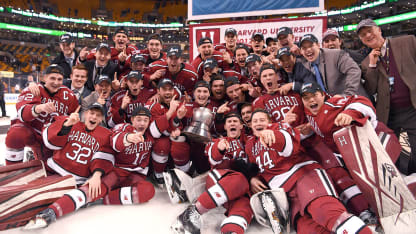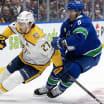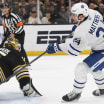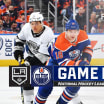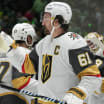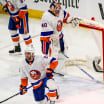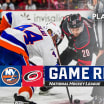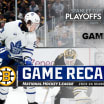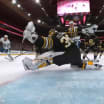EDITOR'S NOTE: Each February, TD Garden in Boston is the site of the traditional showdown between four of the city's college hockey programs: Boston College, Boston University, Harvard and Northeastern. With the 65th edition of the tournament having been completed this past Monday, NHL.com takes you through the rich history of the event, from its inception through another memorable finish this year, with participants reflecting on the highs, lows and oh-so-predictable snowstorms that make up Beanpot lore.
Beanpot has truly stirring history
Key figures share memories of storied Boston college hockey tournament
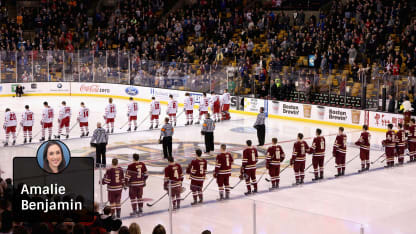
BOSTON -- The snow had been pushed and pulled, bulldozed and shoveled into various piles, but still remained tucked up under cars, crowding sidewalks, frosting lawns. The forecast had been dire, more snow expected to be dumped on a region that saw almost a foot days earlier, and there were, as usual, questions about whether the Beanpot games would be played as scheduled.
It felt right, somehow. It is the risk the Beanpot has always run, being played in early February. That is the benefit and the curse to the four-team tournament that has been played every hockey season since 1952-53, and in February since 1955.
Well, mostly in February. Sometimes the snow has other plans.
If there is a theme that runs through the Beanpot, through 65 years of winners and losers, championships and consolation games, BU's triumphs and Harvard's disappointments, it is this: Boston. It is closeness and community, Commonwealth Avenue rivalries and taking the trolley to the game. It is rooted in a city that is as provincial as they come, with a tournament suddenly featuring those from Stockholm and San Diego and Tampere, Finland, just as much as those from Charlestown and Billerica. It is hardy souls and boots stomping off the slush and the chill from outside melting into the chill in the TD Garden to be greeted by school bands and full houses and chants befitting a college football game.
"You've been through your holidays for a whole month," said Jack Grinold, the associate athletic director emeritus and former head of the communications department at Northeastern. "It's another month to go before tournament time. And so here is this little period of time when our unique geography of four major academic institutions within a couple of 'T' stops of each other get together for this mystical tournament.
"It's like Opening Day at Fenway Park. It's like Marathon Day. It comes at just the right time when you're in a bad mood. You're too far away from the holidays, you're not close enough to spring."
The snow falls outside; Boston gathers, to revel in itself, to salute its own, to watch hockey. Because that is what the city does. It's who the city is. It's what the Beanpot will always be.
\\\\
"To be a local kid and go to every single one as a kid growing up, to finally have a chance to play in it …" Boston Bruins forward Jimmy Hayes said, a glint in his eye and a smile spreading across his face. "It's just a dream come true for a local kid."
Hayes and his BC teammates went into the final of the 59th Beanpot in 2011 having beaten BU 2-1 in overtime in the first-round game. They led Northeastern 6-5 with 1:46 left in the third period when the Huskies tied the game, sending it to overtime.
Six minutes into overtime, Hayes scored the game-winner on a second-chance play to give BC the title and, once again, deny Northeastern.
"I got lucky enough to bang home a rebound and we won in the final," Hayes said. "I think the only thing that could top that would be scoring the Stanley Cup winner."
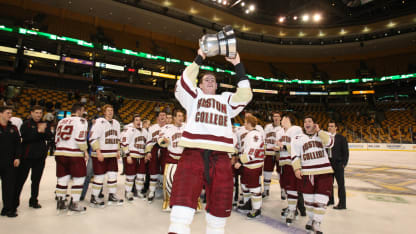
\\\\
But the Beanpot didn't start as a testament to a city and its love for college hockey. It started, in some ways, as a matter of convenience and ticket sales.
All four schools - BU, BC, Harvard and Northeastern - used Boston Arena, now Matthews Arena and home only to Northeastern, for hockey, resulting in doubleheader after doubleheader. There were few days that contained single hockey games because, as Grinold said, "Ice time was just too valuable."
And when those doubleheaders involved the Boston schools, attendance would shoot up. For years, some at the schools had been proposing a four-team tournament, but it wasn't until 1952 that Walter Brown, the founder of the Boston Celtics and president of Boston Garden, was convinced.
"There was some discussion about who should play who and how a tournament should evolve and Walter Brown simply pointed to the way they were sitting and said, 'OK, Game 1, you're one, two, three four. One will play two. Three will play four, and we'll alternate all the way through, year-by-year,'" Grinold said. "So that was a simple solution."
It would be the New England Invitational Hockey Tournament, followed a week later by the New England Invitational Basketball Tournament.
"Ernie Roberts of the [Boston] Globe prognosticated that the basketball tournament would probably do very well, but it was questionable whether the hockey tournament would do well," Grinold said. "Of course, it turned out to be just the opposite."
But it took a few years. The first night drew 5,105. The second drew 3,382. By 1960, though, the tournament topped 10,000 in attendance. And in 1961, the Beanpot filled Boston Garden, the true measure of success for college hockey. There it was: 13,909, a number that slips off the tongue of the Beanpot faithful like few numbers in Boston since 1918. The Beanpot had arrived.
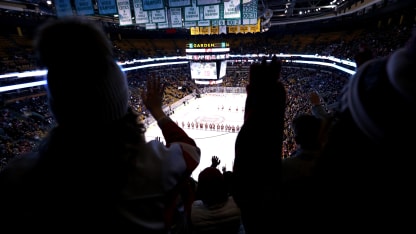
© Maddie Meyer/Getty Images
\\\\
As Hayes scored that game-winner in 2011, a Northeastern-committed prospect sat watching the tournament while with Dubuque of the United States Hockey League. He did not end up going to Northeastern. Instead, Calgary Flames left wing Johnny Gaudreau ended up where Hayes had been, on the BC Eagles.
"I was committed to Northeastern at the time and then BC beat them in the Beanpot championship," Gaudreau said. "I ended up decommitting that summer, ended up going to BC. That memory always stuck out to me because I was cheering for Northeastern pretty badly that game, that whole game, and then BC won 7-6. It was a nail-biter there, a lot of goals, a lot of fun to watch."
In the three seasons Gaudreau was at BC, the Eagles won all three Beanpot titles, beating Northeastern in the final in 2013 and 2014.
Watch: Johnny Gaudreau talk after 2013 Beanpot Championship on YouTube
\\\\
Northeastern was the only one left. The only one without a win in the final, without a Beanpot title, without a piece of the glory that had magnified through the early years of the championship, through the 1960s and '70s.
Harvard won the first Beanpot in 1952. BC won the second, in 1954. It took BU, which has won the most Beanpots (30), until 1958 to take its first. But here it was, 1980, and Northeastern still had not won.
This year did not look promising either.
The Huskies were 3-11, slumping through the beginning and the middle of the season, wallowing toward more disappointment. They beat BU 6-5 in the first round in overtime, setting up a meeting with BC in the final. That game, too, headed into overtime.
The goal that ended it was unspectacular, nothing fancy. It was timely. It was opportunistic. But it gave Northeastern, for the very first time, a 5-4 win in the final of the Beanpot, courtesy of Wayne Turner.
"The moment on the ice, I must say probably is a little blurry, to be honest," said Turner, now the director of HR technology at MIT.
And yet, it still means something. At least a couple of times a year, someone will recognize the name, recall the moment, connect the dots. The kid from Edmonton who came to Boston to play college hockey still gets noticed for a moment that happened nearly 40 years ago.
"It's kind of mind-boggling," Turner said. "I never suspected that the name would mean anything. When people say my name, they say, 'Oh yeah, the Beanpot guy.'"
Northeastern would win its fourth title in nine years on Feb. 8, 1988. It has not won since.
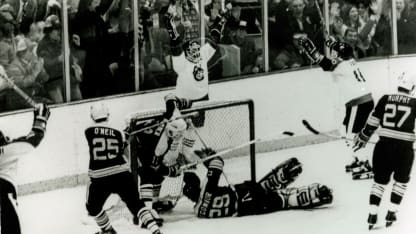
\\\\
It was, as Grinold put it, "the most poignant Beanpot ever played."
Fern Flaman, a Hockey Hall of Famer, was the coach of Northeastern, a former tough guy who was beloved among his peers. His son Terry, a former Harvard captain, was a kid who had grown up to be, as former BU coach Jack Parker said, "Just like his father. He was tough and he was strong and he was a real gentleman and a real nice guy."
And he was critically ill. Terry Flaman had been diagnosed with terminal cancer, and he was in the final stages as the 1984 Beanpot took place. He was there for the final against BU, sitting in a wheelchair in the stands, watching his father and his team try to win their second championship.
They won 5-2.
"We were lined up to give out the trophy and both teams are at center ice," Parker said. "Some Northeastern football players picked Terry up and carried him down from the loge seats to the rink level. You could see it all happening. They brought him through all the seats and the crowd."
He celebrated with his father and the Northeastern players at center ice, and later in the locker room, where Parker visited.
"It was one of the most emotional things I've ever been through as a human being," Parker said. "Fernie gave me a big hug and I'll never forget it as long as I live. He almost squeezed the breath out of me."
Because there was Terry, in the midst of the party, with the Beanpot trophy in his lap.
Three months later, he was dead.
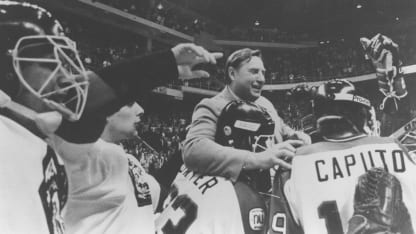
\\\\
While the tournament, based in a city known as Beantown, came to be known as the Beanpot, it has had other names, official and unofficial. The event that started as the New England Invitational Hockey Tournament came to sometimes be called the Jack Parker Invitational. The last might be the most accurate.
BU had won the Beanpot an astounding 30 times in 64 years heading into the 2017 edition. But what is perhaps more incredible is that in those 64 years, BU has played for the trophy 51 times.
"I do think there's psychology that works in all directions," said Lane MacDonald, who won the Beanpot (and the national championship) with Harvard in 1989. "For whatever reason BU for a long time just felt like that was their tournament, whether they were doing well in the year or they were not doing well. They just seemed to go in with confidence and the belief and almost in a relaxed way, a relaxed confidence."
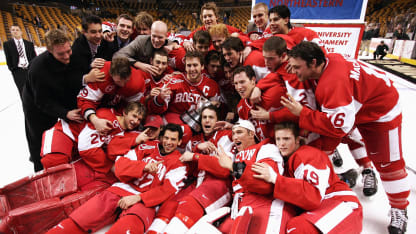
© Elsa/Getty Images
There were so many wins for BU. So many great moments. But, in the end, no BU win was more remarkable than one in the sole Beanpot that was completed in March.
That would be 1978, a Beanpot that, again, was all about the snow. The Blizzard of '78, to be clear, a storm that hit Feb. 5-6, yielded 27.1 inches of snow, saw hundreds of homes destroyed by flooding and caused 73 deaths in Massachusetts. As a result, the Beanpot final was postponed until March 1.
As for the first-round games of Feb. 6 during the blizzard, "We made a decision at 1 o'clock that the game should go forward," said Steve Nazro, the just-retired tournament director of the Beanpot and the vice president of events at TD Garden. "I've never regretted it because I don't know that we would have ever finished the tournament if we hadn't played."
With that decision, the Beanpot moved forward, though it was destined to be unlike any other, before or after.
"We were watching the forecast on Sunday and Monday morning and I called our business officer and told him, 'I think we'd better get a bus,'" said Parker, who played in three Beanpots, was an assistant coach in four, and coach in 40, all at BU. "We'd never taken a bus to the Beanpot before. It's right down the street.
"On the way home, we see all these students coming back from the Garden with their BU stuff on, so we'd just stop, 'Hey, you going to campus? Get on.' We kept picking up stragglers that were trying to make it back to BU. A lot of people didn't make it back."
That included some of the people on his own bus following BU's first-round victory against BC. BU player Jack O'Callahan made his way to the front to ask Parker for a favor. He knew that when the bus dropped everyone off at the school's rink, the players would just brave the blizzard to celebrate their win at the local BU spot, the Dugout. He asked if, possibly, they could be let out by the bar, given the unusual circumstances.
"I squeeze my way down to the middle of the bus and said, 'Guys, just so you know, this bus tonight is going to make two stops instead of just one,'" Parker said. "'It'll make a stop at the Marsh Chapel in the middle of campus if you want to get off and say a prayer. Anybody else who wants to stay on and come up with us to the rink, you can do that as well.' The entire bus emptied [at the chapel], except for myself, my trainer, my equipment manager and one student manager. Everybody else, including the director of athletics, got off the bus."
Religious fervor? Or perhaps it was the location of the Dugout: across the street from Marsh Chapel.
Those that didn't make it back also included approximately 80 of the 11,666 fans in attendance, who ended up stuck at the Garden overnight, along with some staff and media members. The Bruins opened their locker room to the press, who tried to catch some sleep on training tables. The rest -- the fans -- spent the night in a club for season ticket holders, a wide-open space on the mezzanine level.
"I am told, although I don't know this for sure, that there were actually poker games going on," Nazro said. "And many included our employees who live in Charlestown, but chose to say they were snowed in."
\\\\
There was no precedent for this: BU had just won the Beanpot for the fourth consecutive year, creating a senior class, led by Chris Drury, that had known nothing but winning in the annual tournament.
"It was important to them to take a picture of that senior class with the Beanpot afterward on the ice and, lo and behold, they had to make sure they got somebody else out there too," Parker said. "And that was Travis Roy."
Eleven seconds into his collegiate career at BU, Roy had sustained a cracked fourth vertebra after going headfirst into the boards. He was left paralyzed from the neck down after the injury, which occurred on Oct. 20, 1995. But on Feb. 9, 1998, there he was at center ice as his former teammates put the Beanpot trophy in his lap, assembling around him.
"He came down to the locker room before the game and gave a pretty good speech," said Albie O'Connell, then a member of the Terriers and now their associate coach. "It was heartfelt and it was well-done. … It was nice to see him having a grin on his face at the end of it, when it should have been his time."
\\\\
Starting on Jan. 24, 2015, the snow fell. And fell. And fell. It would be the start of the snowiest February on record in Boston, with nearly 65 inches in a month in a winter that would see a total of 110 inches from start to finish.
The Beanpot, of course, was right in the middle of it.
"It seems like the stories -- when everything runs smoothly, no one remembers it," Nazro said. "But when there's trouble, everybody remembers."
Though the first round and final have been played on the first two Mondays in February since the late 1950s (except for 1978), that wasn't going to be possible in 2015. The first-round games had already been pushed back one day from Feb. 2 and the final ended up postponed to the only day available to both the TD Garden and the four schools, Feb. 23.
And the ending of that final between BU and Northeastern got pushed back as well, into overtime, as seems usual in the Beanpot. Once there, it took just 51 seconds for BU defenseman Matt Grzelcyk, now a Boston Bruins prospect, to score a power-play goal to give BU a 4-3 victory its 30th title, to put an end to a Beanpot that took 20 days from start to finish. But that wasn't all of the story.
Watch: Matt Grzelcyk's Beanpot-winning goal in 2015 on YouTube
Because this was, essentially, home for Grzelcyk, who grew up a few miles away in Charlestown, and whose father has worked for 49 years as a member of the bull gang and a Zamboni driver at Boston Garden and, later, TD Garden.
For Nazro, the moment was the ultimate highlight of his 50 years affiliated with the Beanpot, a tournament as wrapped up in Boston as any has ever been, as the snowbanks sat outside, promising not to fully melt until nearly the heat of summer.
He still remembers the words he spoke to the crowd as he handed out the MVP trophy, thrilled to the core. He remembers the sticks going up in the air and the celebration, delayed gratification perhaps making it all the sweeter. It's hard, he says now, to explain just how meaningful the moment was, how right.
"I said, 'And the most valuable player for the 63rd Beanpot tournament is one of our own: Matt Grzelcyk,'" Nazro said. "It was great. It was just great."
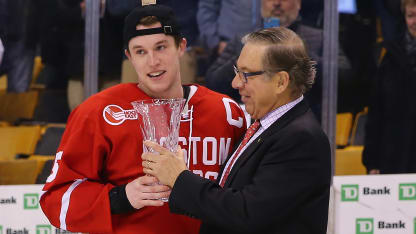
© Maddie Meyer/Getty Images
\\\\
It was 2000, and the Harvard Crimson were playing BU in the first round of the Beanpot. Harvard freshman Dominic Moore, who now plays for the Bruins, was getting his first taste of what college hockey truly meant in Boston.
"I scored what is a highlight-reel goal, where I took the puck, made a move, went down, held it, went around the net, came out the other side, shot it between a defender's legs top corner on Rick DiPietro, who was the goalie for BU," Moore said. "I'm pretty excited, it's an NHL arena, first Beanpot.
"I was pretty pumped up. Highlight-reel goal. And all of a sudden, the refs start convening over by the BU bench and, lo and behold, a few minutes later they called the goal back after video review. And no one even told us there was video review. But somehow Jack Parker convinced the refs because this game happened to be on TV - because not all the games were on TV then. To me it seemed like they just made up the rule and disallowed the goal.
"And I'm obviously still bitter about it."
Harvard lost that game 4-0 to BU. In the next 16 years, Harvard made the Beanpot final only once, in 2008, when it lost 6-5 to BC in overtime.
\\\\
The past three years, as long as this senior class had been at Harvard, it had played before Beanpot crowds that could be easily counted, the friends-and-family gatherings that have typified the early games of the doubleheaders. They had not won and, so, they had not seen what it could be.
As the Crimson took the ice Monday at TD Garden, the force of the Beanpot final met them; the partisan crowd, the full-throated chants, the bands in opposite corners, the love and pride and need on display. This was the real Beanpot, offering them a chance at redemption, at their first title since 1993.
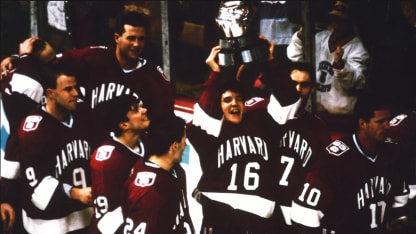
They had come into this game knowing they could win it, with all the want and desire they possessed, seeing an opportunity to win a championship. And they did, by overwhelming BU with their speed and skill and relentlessness, outshooting the Terriers 18-2 in the first period and 46-17 in the game, en route to a 6-3 win.
Harvard got two from Nathan Krusko, the eventual MVP and a freshman from Georgia who didn't exactly grow up with Beanpot MVP aspirations. But he knew how much it meant to the rest of them, to teammates from Cambridge and Burlington and Scituate, to the Crimson seniors, to the coach who has led his alma mater since 2004.
"I didn't think it was going to take 13 years. I'll tell you that much," Harvard coach Ted Donato said. "I grew up in Boston. I've played a million street hockey games being one of these Beanpot teams."
He had won one as a player, back in 1989. And now, he had won one as a coach.
It was what, in some ways, Parker had been hoping for all along. Because if BU couldn't win it, for the sake and health of the tournament, Parker had wished Northeastern or Harvard, teams that had waited nearly a quarter century, would break the BU-BC stranglehold.
It had seemed for so many years that the luster was off the Beanpot, that it had become a race between two teams, without any room for the rest. But there were the Crimson with 10 seconds left, legs slung over the boards, ready to jump on the ice, ready to toss off gloves and helmets and sticks, ready to celebrate like they had just won the Stanley Cup.
For some of them -- those whose careers won't go much beyond this tournament, this season, these heights; for those who, like Donato, had envisioned this moment playing street hockey years ago -- it was as if they had done exactly that.
